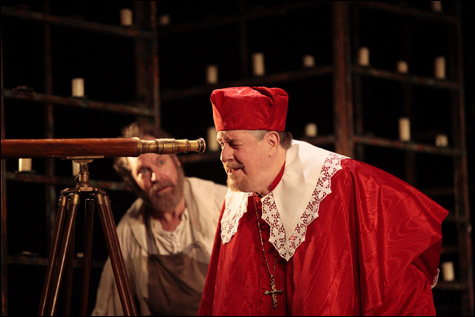
TWO MEN OF FLORENCE The line between epic and elephantine is thin, and so are this play's emotional underpinnings. |
It takes chutzpah for a first-time playwright to get into the ring with Bertolt Brecht. But nerve comes as no more surprise than oratory when the fledgling dramatist is former JFK and LBJ speechwriter Richard N. Goodwin, whose Two Men of Florence, in its American premiere by the Huntington Theatre Company (at the Boston University Theatre through April 5), joins Brecht's Galileo in chronicling the clash-of-the-Tuscans smackdown between "Father of Modern Science" Galileo Galilei and Pope Urban VIII over whether the earth stood still.The battleground of faith and science is vast territory, and there is room for more than one dramatist in 17th-century Rome. Trouble is, Goodwin remains a speechwriter, not a dramatist, and Two Men of Florence, despite the whirling turntable that is part of Francis O'Connor's lavish planetarium-inspired production design, remains about as static as the pope claims Earth is. The play is so stuffed with words and pageantry that one almost misses Goodwin's mightiest contribution to the story: the climactic moment when the science-prone pontiff formerly known as Cardinal Maffeo Barberini is himself almost seduced by Galileo's heliocentric findings into the giddy, liberating notion that "We move!" (and less by God's grace than by our own powers). Coming to his senses, the chastened pope falls to his knees, and Galileo's heretical fate is sealed.
Two Men of Florence has been kicking around for a decade (American Repertory Theatre held a staged reading of an earlier version in the late 1990s). But the official world premiere of the work, then called The Hinge of the World, took place in 2003 in Guildford, England, where the play was helmed, as it is at the Huntington, by scion-of-British-theater-royalty Edward Hall. The son of Sir Peter Hall, the director is best known for Rose Rage, an epic distillation of Shakespeare's Henry VI plays. He is, it's clear, not afraid of size, and Two Men of Florence is a big play, deploying much information, no little imaginative fillip, two dozen copiously costumed characters, and the sparkle of the spheres as it works its way through 33 years and most of Italy. The production, too, is rather grand, its glimmering rendering of the heavens, once Galileo points his telescope in their direction, suggesting the lure of space that dominated Goodwin's own political heyday of the 1960s.
But the line between epic and elephantine is thin — as are the emotional underpinnings of Two Men of Florence, which boasts only four characters who are more than ciphers and supplies even its supernumeraries with the sort of ponderous speech that sounds more like papal edict than dialogue. Goodwin pens speeches not just for Jay O. Sanders's burly Mr. Wizard of a Galileo and Tony winner Edward Herrmann's tall, gliding, lace-collared cardinal-who-would-be-pope but also for Galileo's child-nun/lab-assistant daughter, Maria Celeste (who announces wide-eyed that if her Aristotle-bashing dad's Copernican views are given sway, "The entire division of the world between the perfect heavens and the perishable earth is undone"), and even the nobleman in the street, who gets to quote Ecclesiastes.